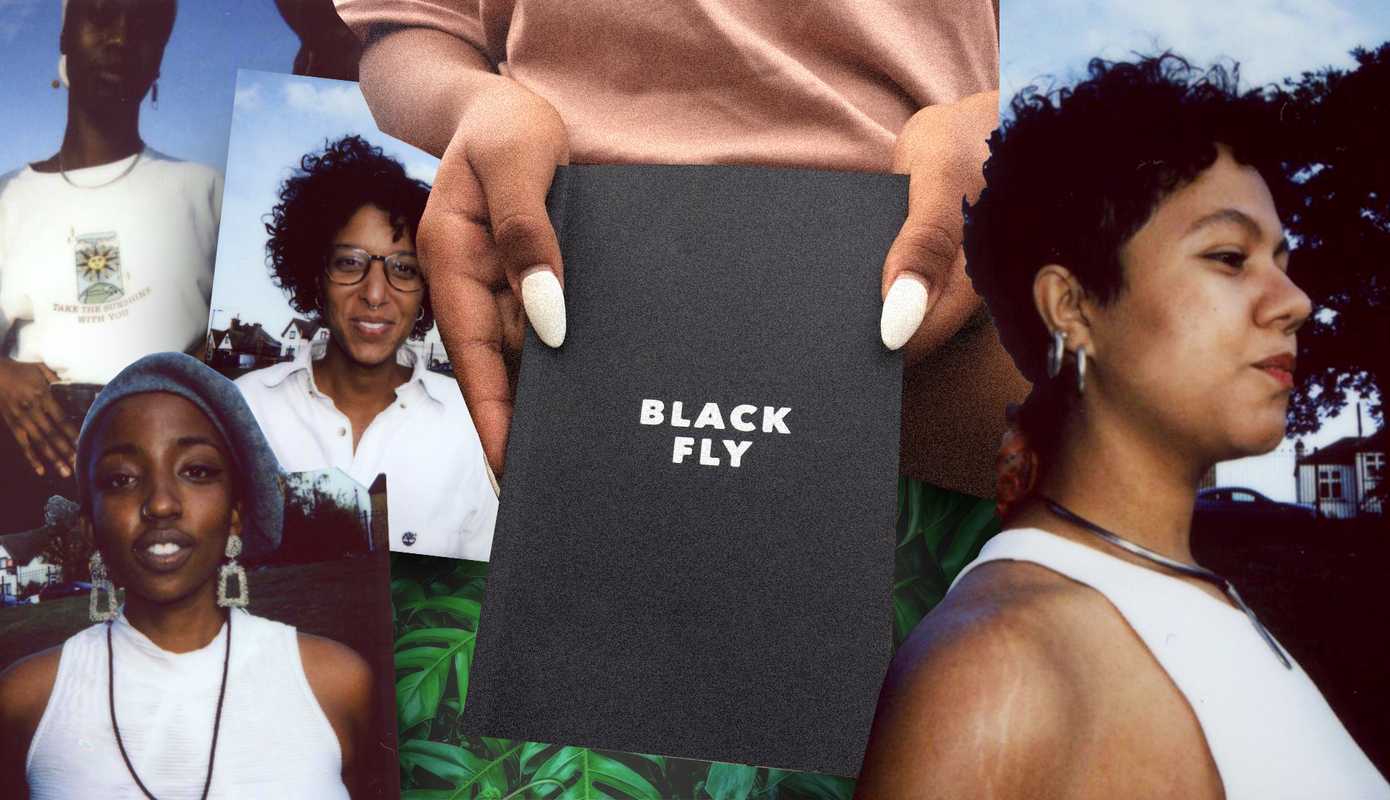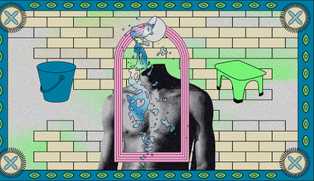This article was made possible by donations to the Black Creatives Fund. Donate now.
Earlier this year, the collective behind Black Fly Zine announced their manifesto: an exciting pledge, full of energy and idealism, to support the wellness of Black and Brown bodies past, present and future.
Founded in 2016 by Ella Frost and Nana Adae-Amoakoh, Black Fly Zine’s aim is to centre the sexual lives of Black and Brown people, recognising the colonial legacies of sexual trauma, and honouring intergenerational experience. Using each other as inspiration, they collectively unpack binaries, embrace the complexity of desire and see the journey to sexual healing as a future of never-ending twists and turns. Black Fly Zine is a celebration of all things sticky, messy, raw and open.
The collective published their first issue in 2017, and earlier this year they were nominated as Grassroots Organization of the Year at the Sexual Health Awards 2020. Ahead of the release of their second issue, Oliver Taylor caught up with Ella Frost and buitemelo, two of the now five-strong collective, to talk about their work so far and their plans for the future.
Oliver Taylor: How did folx receive the first issue of Black Fly Zine?
Ella Frost: It was received really well. A lot of people were like, ‘yes, this is completely needed!’ I was taken aback by how forthcoming people were about their experiences. It became less about us processing our own experiences and more providing a platform for other people.
OT: What’s the importance of sexual health and sexual positivity for Black folx and POC right now?
buitemelo: We’re under attack, man! People don’t want Black people to fully enjoy every aspect of themselves. It’s still uncomfortable around sex workers, and the majority of the ones I know are Black and Brown. These sex workers are the biggest advocates for sexual health, sexual safety and sexual awareness. We’ve learned from these people, whose voices our society wants to shut out the most.
EF: Sexual wellbeing is important because having shame… it can do a lot of damage to you, more than you think. It’s a really complicated and loaded feeling. There is a lot of shame in Black and Brown communities that probably weren’t put there by us, but we have to work with it and through it.
b: And I think sex is one of those things, because someone will be like, ‘Hey, why are you carrying that shame around?’ and they won’t be able to link it to ‘Oh, because of the thing that happened or because of how I view this, I now carry this level of shame.’
EF: Statistically in terms of pretty much all major bacterial STIs, like syphilis, gonorrhoea and chlamydia, infection rates are higher in Black and Brown people. And shame, which stops people from getting tested, is [one of the many factors that stops us from] accessing information and services.

OT: How can BIPOC communities move beyond shame and beyond colonial legacies of sexual suffering to a renewed sense of sexual joy?
EF: We can do this by creating communities of safety whether they’re online, IRL, or your home life. And pushing for it, because we deserve it.
b: Starting to realise when you are consenting to things and when you are not, because so much of our history is just things happening to us without our consent. We’re now in a place where consent is in everyone’s mouth, so everyone should know what it means. Realising we have the agency, because some of us haven’t been aware of that for a long time.
OT: What’s the theme for the next issue of Black Fly Zine?
EF: The word ‘tonic’ is what we wanted people to tap into in terms of submissions. We’ve moved away from healing because it’s everywhere. We were talking about healing and getting better, but not as this final stop or as this one size fits all.
b: Tonics baby. Because it starts and finishes with the meat skin. We know that drugs and alcohol can alter your mood, but what are the other things that you can add and be like, ‘oh, that creates a better night’s sleep or enhances an orgasm’?
Tonic feels very present. From when we started talking about it, it’s felt very like ‘what’s helping me today, in this moment?’

OT: You recently reformed the collective – how has that impacted your work?
EF: [Before] there were only two of us managing the project. Reforming into this new collective, and having such an array of different visual eyes in the room, has been so great.
b: We’re dark-skinned, we’re light-skinned, we’re African, we’re Black British inner city, we’re Black British outside of the city. Taking the things you’ve been through, then saying, ‘okay, what’s next?’ Let’s be more arty, let’s embrace sexuality using these new words, these new eyes and images, using the first [issue], drawing it all together putting it into one of those cake mixers and doing Black Fly 2.0.
OT: You’ve been running workshops recently too. Tell me about your workshops with mental health collective Misery Party and sex worker-fronted organisation Sex and Rage?
EF: It’s been nerve wracking and thrilling in equal measure, because you don’t know what’s going to come out of it.
For Misery Party, we did a workshop exploring Audre Lorde’s essay ‘The Use of the Erotic’ we wanted to break down the concepts meaningfully and playfully, how to access pleasure and what pleasure means from an individual perspective’.. We got a lot of positive feedback, a lot of people were like ‘thank you so much, I hadn’t thought about sex like this’
b: The essay is about how working from that place of the erotic isn’t just about sex and fucking. It’s where you gain most of your power, just as a being. You’re really in tune with yourself and it starts with the erotic. It starts with pleasuring yourself and being able to differentiate between what is pornographic and what actually gets you turned on. If you’re turned on to what turns you on that’s how you start manifesting. That’s how you start so many different avenues of living in a world that kind of tells you ‘no’.
EF: The Sex & Rage workshop was about tonics, balance, our bodies and was quite, like, experimental, very sex positive but also spoke about how our bodies are interpreted in the white gaze. The whole point of Sex & Rage is that it’s organised by sex workers and it was a real privilege to work with them.
b: Our bodies have stories that we’ve been told to ignore, to put to the side or to misinterpret. Tonics, our bodies and balance; I think we agreed that we needed those three things to be in tandem. They need to be in time to work together.
So our bodies, what heals them, and how we relate to other people is all connected by the way we connect with ourselves. I believe that our workshops and the work that we do are designed to facilitate integrating all our facets. To show how we approach this work and how we protect ourselves. I felt like I was being workshopped as well.

OT: What are Black Fly Zine’s plans for next year, or the next five years?
EF: One smaller project I want to work on is around vampires and their representation through other cultures. I found vampires were being whitewashed – there are loads of different depictions of blood-sucking creatures in African, Asian and Caribbean cultures and we wanted to give some access to that for people who love vampires. They’re the coolest and that intersection between horror and sex is fun to research.
We want to expand. We’re thinking of a website, an annual issue of Black Fly Zine, collaborations with different organisations, panels and exhibitions. We’re thinking mini zines on different topics, more workshops that collaborate with more people. Everything!
Art residencies, please – put us in a villa and give us a project. Long-term funding, so that we can pay ourselves.
OT: Who would you like to engage with more in future?
EF: Organisations doing similar work across the diaspora, including places we are from, so for me Barbados and the Caribbean islands generally, connecting with other advocates and creatives. We would also like to connect to south and Central America. I would love for us to include voices that are older and teenagers. Everyone basically, because there are a lot of voices to be heard and work to be done.
b: For me personally, I think it’d be going to more African countries. Specific African countries I want to target are Zimbabwe, Botswana, South Africa and Senegal; they all hold immense personal importance. I think there’s a lot of people talking about sexual health and I think it’s from a colonised perspective.
OT: Finally, how do you reimagine the future of art at the intersection of sexual health and racial identities, in opposition to mainstream attitudes?
b: I think we’re going to be put through a tumble dryer, having repeated conversations with more and more institutions, realising that people need to dig deeper within themselves. The mainstream will just keep doing what the mainstream does. Now as creators I feel the responsibility to still be protective of Blackness and what I view as Blackness and Queer people and Brown people. I reimagine the future of art as a space that keeps safety and love and authenticity at the head of what we’re doing.
EF: It’s already getting in the heads of people who are younger. What we’re saying is shedding, it’s unlearning, it’s redefining over and over again. It’s accepting as well, not being ashamed of your identity.
You can find out more about Black Fly Zine on IG @blackflyzine and via their Linktree. If you are interested in contributing financially, contact Ella Frost at blackflyzine@gmail.com




